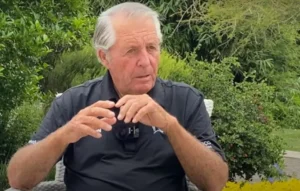The recent resurgence of golf star Tiger Woods at the 2024 Masters has sparked conversations about his storied career, prompting former Masters champion Scottie Scheffler to rise to the top of the PGA Tour. However, amidst the celebration of Woods’ return to form, golf legend Gary Player has stirred controversy with his bold assertions about what derailed Woods’ career trajectory.

Player, a revered figure in golf history with 24 PGA wins and nine majors under his belt, pulled no punches in his assessment of Woods’ downfall. In an interview with KW Golf, the 88-year-old Player pointed to a pivotal moment in 2000 that he believes altered the course of Woods’ career irreparably.
Recalling Woods’ dominant victory at the 2000 US Open at Pebble Beach, where he won by an astonishing 15 shots, Player likened it to a sprinter breaking records in the 100 meters. However, Player contends that Woods’ decision to seek coaching from individuals whom Player regards as subpar players fundamentally derailed his trajectory.
Player’s criticism is sharp, targeting Woods’ choice to seek lessons from coaches whom Player suggests lacked the caliber to guide a player of Woods’ stature. Player’s assertion that Woods’ career was “ruined” by these coaching decisions has sparked debate among fans and analysts alike.
While Player’s viewpoint is polarizing, it overlooks the myriad challenges Woods has faced in recent years, including health issues, personal struggles, and a high-profile car accident. Despite these obstacles, Woods’ dominance in the golf world post-2000 cannot be ignored, with a string of victories and major titles cementing his legacy as one of the greatest golfers of all time.
However, Player remains steadfast in his belief that Woods’ decision to deviate from his winning formula in 2000 ultimately prevented him from achieving even greater heights. Player suggests that had Woods stayed the course without changing coaches, he could have amassed a staggering 22 majors, solidifying his status as the greatest athlete in history.
The debate over Woods’ career trajectory rages on, with fans and analysts offering varied perspectives on the factors contributing to his success and setbacks. While some attribute Woods’ struggles to personal issues and external circumstances, Player’s stance underscores the importance of coaching decisions in shaping a player’s legacy.
Ultimately, the discussion surrounding Tiger Woods’ career serves as a testament to his enduring impact on the sport of golf and the complexities of athletic greatness. As fans reflect on Woods’ journey, they grapple with the question of what might have been and the enduring legacy of one of golf’s most iconic figures.
